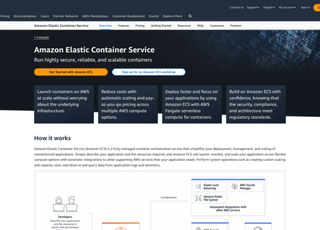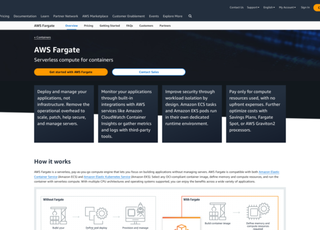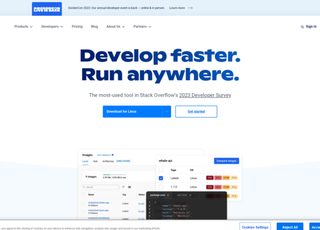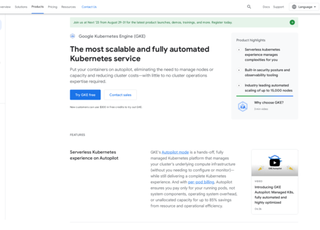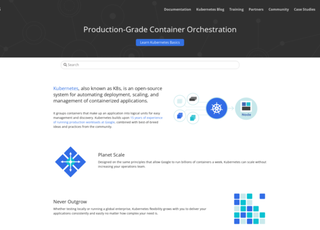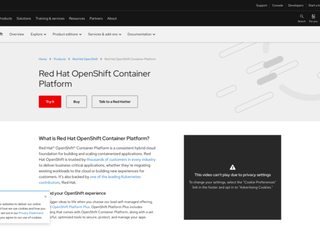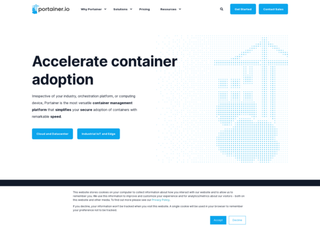Azure Kubernetes Service (AKS)
https://azure.microsoft.com/en-us/products/kubernetes-service/Azure Kubernetes Service (AKS)
Azure Kubernetes Service (AKS) is a managed container orchestration service, provided by Microsoft Azure, that simplifies the deployment, management, and scaling of containerized applications using Kubernetes.
Detailed breakdown of its features and benefits:
Kubernetes Integration
AKS is built around Kubernetes, an open-source system for automating deployment, scaling, and operations of application containers across clusters of hosts. This means you can leverage the widespread expertise and tools developed for Kubernetes.
Managed Service
As a managed service, AKS handles critical tasks like health monitoring and maintenance for you. This includes automated upgrades, patching, and scaling, reducing the operational burden on your team.
Scalability
AKS offers easy scaling of applications. It can automatically adjust the number of virtual machines (VMs) in your container clusters, depending on the needs of your workload.
Integrated Developer Tools
It integrates with Azure DevOps, Visual Studio Code, and other CI/CD tools, making it easier for developers to build, test, and deploy applications.
Security and Compliance
AKS includes features like Azure Active Directory integration and Azure Policy for Kubernetes, enhancing security and compliance. Network policies and role-based access control (RBAC) help in securing access to Kubernetes resources.
Hybrid Environment Support
AKS supports hybrid environments, allowing you to build and manage applications that span on-premises, multi-cloud, and edge environments.
Microservices Architecture
It's well-suited for microservices architectures, as Kubernetes inherently supports the breakdown of applications into smaller, independently deployable services.
Container Registry Integration
AKS integrates with Azure Container Registry, allowing for secure storage, management, and deployment of container images.
Monitoring and Diagnostics
With integration to Azure Monitor and Azure Log Analytics, it offers comprehensive monitoring and diagnostics. You can visualize the performance metrics of your applications, cluster infrastructure, and even set up alerts.
Cost-Effectiveness
AKS only charges for the VMs and associated storage and networking resources consumed by your Kubernetes cluster, not for the Kubernetes management infrastructure.
Multi-region Availability
AKS is available across multiple Azure regions, providing high availability and redundancy for your applications.
Community and Support
Being a part of the Azure platform, users get access to a vast community and Microsoft's support for troubleshooting and optimizing their Kubernetes deployments.
Application Modernization
AKS is an essential tool in application modernization strategies. It enables businesses to migrate existing applications to containers and manage them efficiently, facilitating a smooth transition to a more modern, cloud-native architecture.
Network Configuration Flexibility
AKS offers various networking options to suit different requirements, including Azure CNI (Container Networking Interface) for integration with Azure's virtual network capabilities and kubenet for a simpler, cost-effective solution.
Stateful Applications Support
While Kubernetes is often associated with stateless applications, AKS also supports stateful applications with persistent storage options. This is crucial for applications that require data persistence, like databases.
Integration with Other Azure Services
AKS seamlessly integrates with a wide range of Azure services, such as Azure SQL Database, Azure Cosmos DB, and Azure Cache for Redis, enabling more complex and powerful cloud-native applications.
Developer Productivity
Features like Azure Dev Spaces and Azure Kubernetes Service Dev Tools enhance developer productivity by simplifying the development and debugging process of Kubernetes-based applications.
Custom VNet Support
Enterprises that have specific network policies can use AKS with custom VNets, offering them control over their network configuration and security.
Auto-Scaling Capabilities
AKS provides both horizontal (adding more pods) and vertical (increasing resources in existing pods) auto-scaling capabilities, which helps in efficiently managing resource usage and maintaining application performance.
Enterprise-Grade Reliability
Azure's infrastructure ensures high availability and reliability, making AKS a robust platform for critical enterprise applications.
Efficient Resource Utilization
Kubernetes in AKS optimizes resource utilization, reducing costs by ensuring that containerized applications use only the resources they need.
Simplified Load Balancing
AKS simplifies the process of load balancing for applications, distributing traffic efficiently to ensure optimal performance and reliability.
Continuous Learning and Improvement
Microsoft consistently updates AKS with the latest Kubernetes releases and features, ensuring users have access to the latest advancements in container orchestration technology.
Ecosystem Compatibility
AKS supports a vast ecosystem of Kubernetes tools and add-ons, allowing users to extend its capabilities to meet their specific needs.
Azure Kubernetes Service (AKS) combines the efficiency of Kubernetes with the simplicity of a managed service, backed by Azure's enterprise-grade security and global infrastructure. It's ideal for businesses looking to modernize their applications with containerization and microservices, without the complexity of managing a container orchestration platform.





















